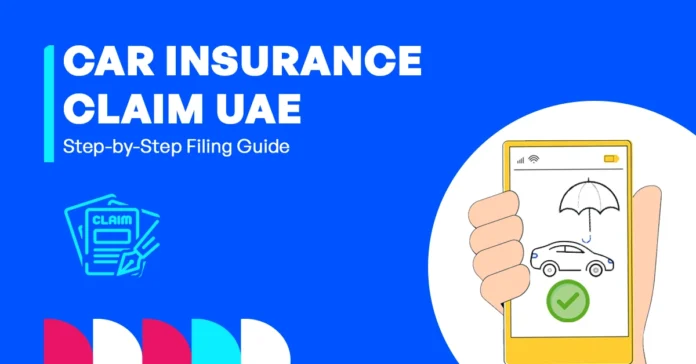Navigating the aftermath of a car accident in the UAE can be overwhelming, especially when you need to file a car insurance claim. Whether it’s a minor fender bender or a major collision, understanding how to file a car insurance claim correctly ensures faster repairs and fair compensation. This guide breaks down the process into five actionable steps, covering everything from immediate post-accident actions to claim settlement. Discover how to gather evidence, submit documents, avoid claim rejections, and maximize your payout—even if the other driver is at fault.
How to File Car Insurance Claim in the UAE: Legal Process
The actual filing of a claim for car insurance in UAE doesn’t start immediately after the accident. First, you need to document it and obtain a police report, which you will then use as supporting documents when you want to actually file car insurance claim.

Here is what you should do right after being involved in an accident:
- Ensure Safety and Secure the Scene
The first priority after an accident is safety. While it’s useful to get pictures from the accident for insurance purposes, it might not always be possible, especially in areas with high-speeding cars passing by, where you’ll need to move your vehicle to a safe location to avoid obstructing traffic. - Call the Police
In the UAE, reporting any car accident to the police is mandatory, no matter how minor. Dial 999 to request assistance if there are injuries involved and it’s an emergency. For minor non-emergency accidents, call 901. The police will document the incident and provide an official accident report, which is crucial for filing a car insurance claim. - Gather Evidence
While waiting for the authorities, collect the following information:
- Photos of the accident scene, including damages to vehicles, license plates, and any road conditions that may have contributed to the crash.
- Contact details of witnesses, if any, who can provide statements.
- Exchange information with the other driver, including their name, contact details, driver’s license, and insurance information.
How to File Car Insurance Claim in the UAE (Insurance Process)
After obtaining the report and documenting the accident, you can start to file car insurance claim by calling your insurance broker or doing it online, which is often possible through the websites of many insurance companies. Either way, the process is usually the same and involves following the steps outlined below:
- Notify Your Insurance Provider
Contact your insurance company as soon as possible. Most insurers in the UAE require you to report the accident within 24 hours. Provide them with the police report, details of the accident, and any additional evidence you collected. - Submit the Necessary Documents
Your insurer will request specific documents, which typically include:- The official police report
- Your Emirates ID and driver’s license
- Vehicle registration (Mulkiya)
- A completed claim form provided by the insurance company
- Photos of the damage
- Assessment and Repair Process
The insurance company will assess the damage to your vehicle. If your policy covers repairs, they will approve a garage from their network to carry out the work. You may need to pay a deductible, depending on your policy. - Claim Settlement
If repairs are covered under your policy, the insurance company will settle the costs directly with the garage. If another party was at fault, their insurance should cover your damages.
File Car Insurance Claim Through Your Insurer vs. At-Fault Driver’s Provider: Which Is Better?
If the other driver is found to be at fault and both of you have car insurance in UAE, you have two options:
File Car Insurance Claim Through Their Provider
The at-fault driver’s insurance is responsible for paying for your repairs. While this can spare you from having to go through the process of filing an insurance claim, it might take longer, and you probably won’t get as much compensation as you might be entitled to.
File Car Insurance Claim Through Your Own Provider
If you have comprehensive insurance or collision coverage, you can claim the damages through your insurance. Your insurer will cover the repairs and then seek reimbursement from the at-fault driver’s insurer. This is a quicker option if the other driver’s insurer is unresponsive because you will have experts taking care of back-and-forth legal communication with the at-fault driver’s insurance provider.
The Difference Between Insurance Types When You File Car Insurance Claim
The type of car insurance you have in the UAE plays a crucial role in how your claim is handled. Below is a breakdown of what happens based on your insurance type and fault status.
| Insurance Type | When You Are At Fault | When Another Driver Is At Fault |
| Comprehensive Insurance | Your insurance covers your repairs, but you may lose your No-Claim Bonus (NCB). | Your insurance pays for repairs initially but will recover costs from the at-fault driver’s insurer. Your NCB remains intact. |
| Third-Party Insurance | Your insurance pays for damages to the other driver’s vehicle, but your repairs will not be covered. | You must claim damages from the at-fault driver’s insurance provider, as your own policy does not cover your car. |
Additional Considerations When You File Car Insurance Claim
- Rental Car Coverage and Towing: If your policy includes rental coverage, your insurer may provide a temporary replacement vehicle while your car is being repaired. Similarly, if your policy consists of a towing service, you can have a tow truck deliver your vehicle to your preferred garage (which must be approved by your provider).
- No-Claim Bonus (NCB): The manner of how to file car insurance claim may affect your no-claim bonus, leading to higher premiums in the future. Some policies allow you to pay extra to protect your NCB. This is only the case when you are the at-fault party.
- Policy Exclusions: Always check your policy terms to understand what is covered and what isn’t.
Common Mistakes to Avoid When Filing Your Car Insurance Claim
The process to file car insurance claim in the UAE can be straightforward—if you avoid these critical errors that often lead to delays, rejections, or reduced payouts. Here’s what to watch out for:

1. Delaying the Reporting Process
- Mistake: Waiting too long to notify your insurer or police.
- Why It Matters: Most UAE insurers require accidents to be reported within 24 hours. Delays can invalidate your claim.
2. Skipping the Police Report
- Mistake: Assuming minor accidents don’t need official documentation.
- Why It Matters: Insurers require a police report to process any claim, even for scratches. No report = automatic denial.
3. Providing Incomplete Evidence
- Mistake: Failing to take photos, collect witness details, or record the accident scene.
- Why It Matters: Insurers need proof to validate your claim. Missing evidence can shift blame to you or reduce compensation.
4. Admitting Fault Prematurely
- Mistake: Apologizing or accepting blame at the accident scene.
- Why It Matters: Even a casual “sorry” can be used against you, impacting fault determination and claim outcomes.
5. Ignoring Policy Exclusions
- Mistake: Assuming all damages are covered without reviewing your policy.
- Why It Matters: Wear and tear, unauthorized modifications, or driving without a valid license can often void coverage.
6. Choosing a Non-Approved Repair Garage
- Mistake: Taking your car to a garage not authorized by your insurer.
- Why It Matters: Insurers may refuse to cover repairs done outside their network.
Mastering How to File Car Insurance Claim
Understanding how to file car insurance claim in the UAE can make the process much smoother and less stressful. By following these steps and knowing your rights, you can ensure a fair and efficient resolution. Whether you choose to file the claim through your own insurance or the at-fault driver’s, being informed will help you navigate the situation with confidence.
Successfully filing a car insurance claim in the UAE hinges on prompt action (reporting to police within 24 hours), thorough documentation (photos, witness details, police report), and understanding your policy terms. Prioritize safety, avoid admitting fault, and work with approved garages to ensure faster repairs and fair compensation. Stay informed to protect your No-Claim Bonus and navigate claims confidently.
Frequently Answered Questions
1. How long does it take to process a claim for car insurance in UAE?
The processing time varies depending on the claim’s complexity and the responsiveness of both insurance companies. Generally, minor claims take a few days to a week, while more complex cases may take several weeks.
2. Is a police report necessary for all insurance claims?
Yes, in the UAE, a police report is mandatory for filing a car insurance claim. Without it, insurers will not process your claim.
3. What if the other driver doesn’t have insurance?
If the other driver is uninsured, your own policy’s uninsured motorist coverage (if available) may cover the costs. Otherwise, you may have to pay for repairs yourself and take legal action against the at-fault driver.
4. Can I choose any repair garage for my car?
Most insurance companies have a network of approved garages. If you choose a non-approved garage, you may have to cover the costs yourself.
5. What happens if my car is declared a total loss?
If the cost of repairs exceeds the car’s insured value, the insurer will declare it a total loss and compensate you based on the market value of the car as per your policy terms.



